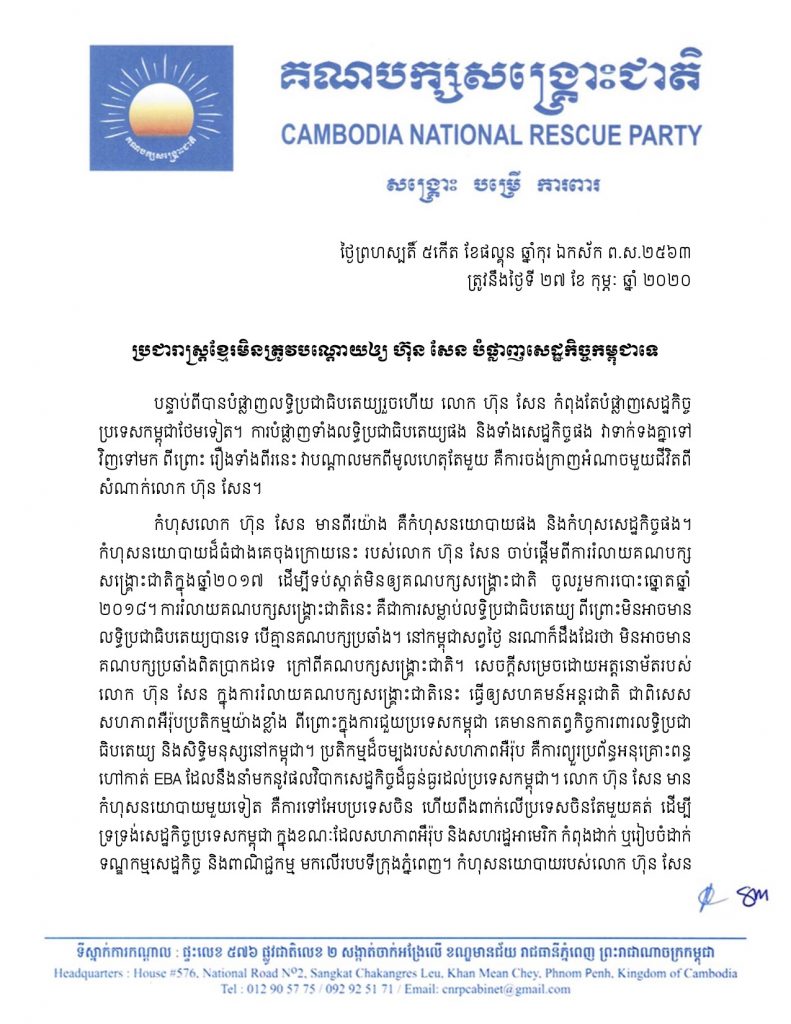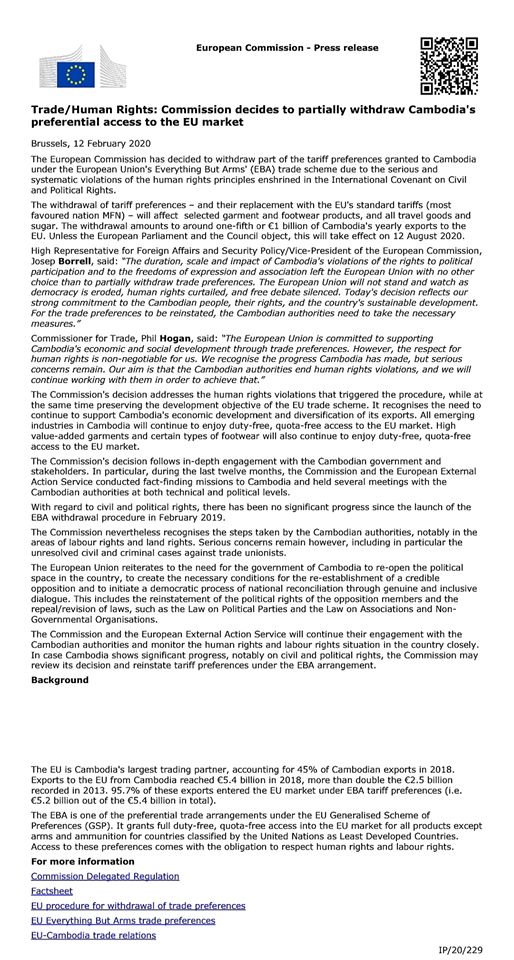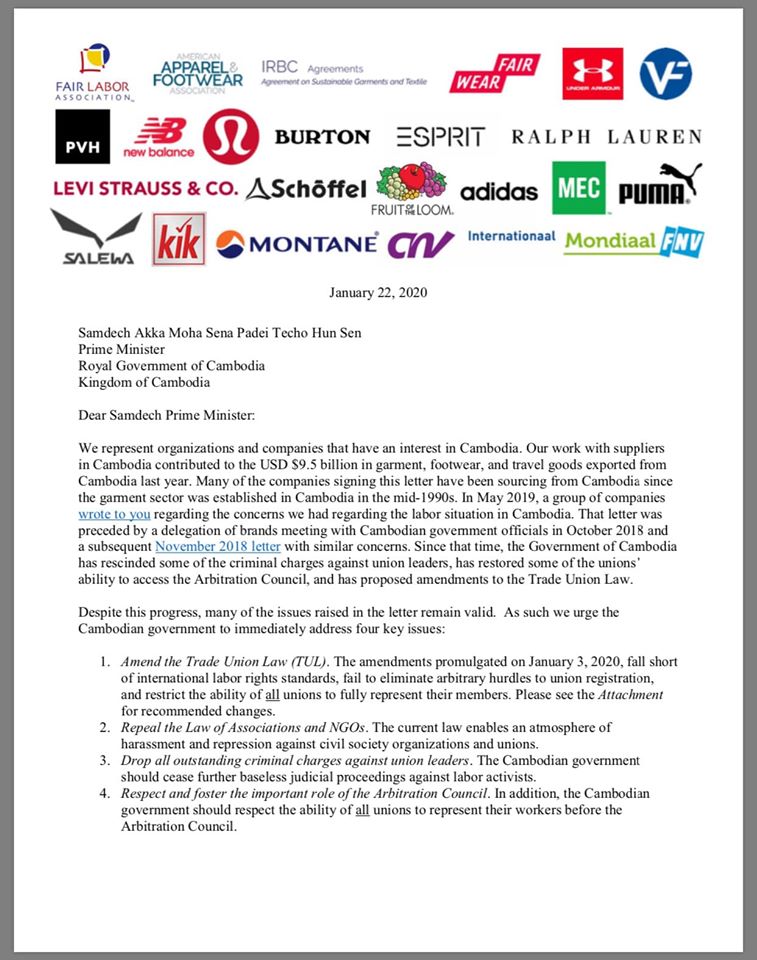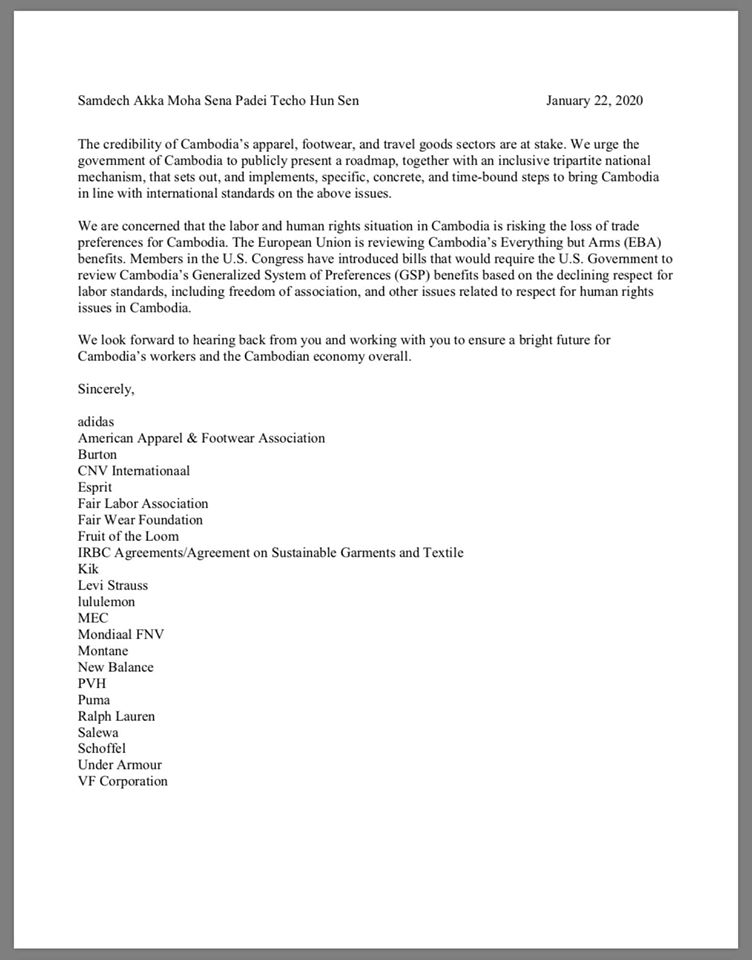Election
now browsing by category
CNRP Statement on Hun Sen dictatorship leadership has stagnated Cambodia democracy and economy
February 27, 2020
The Cambodian People do not allow Hun Sen to destroy the Cambodian economy.
After the abolition of Cambodia democracy, Hun Sen has been in the process of destroying the economy. The destruction of both: the political democracy and the national economy in which these two factors are original interdependent, Hun Sen has a single reason is the desire to maintain his personal lifetime power.
Two grave mistakes Hun Sen has made are political democracy and national economy. The most serious political mistake in this case is the dissolution of Cambodia National Rescue Party (CNRP) in 2017 aiming to preempt the CNRP from participating in the 2018 national election. The dissolution of the CNRP is a killing of democracy because without having a strong oposition party, democracy is totally dead. Everyone knows that without CNRP as opposition party, no other party is credible. Hun Sen’s ultimate decision to dissolve CNRP has triggered the international community especially the European Union reacted swiftly as EU has essential role and obligation to safeguard democracy and human rights in Cambodia. One of the EU’s urgent reactions is to suspend the trade preference named “everything but arm” (EBA) scheme in which has resulted in grave economic slow-down in Cambodia. Another mistake of Hun Sen is to associate with China and be fully dependent on China’s supports of economy development while EU and USA have sanctioned or have prepared more severe economy and trade sanctions over current Cambodia regime.

The latest is a similar case of the Pol Pot whose leadership was wholly depending on China to contain his grip on power, under the Khmer Rouge regime, in the 1970s.
For the economy mistake, Hun Sen has undertaken it since 25 years ago. This failure is caused by Hun Sen’s ignorance and uneducated mindset which has not based on skill, experience and vision to handle the national economy development.
Hun Sen has lacked self-education and does not understand the investment of providing education to the people for nation development, Hun Sen has spoiled the Cambodia education system with disorganized human resource management and low quality standard comparing to neighboring countries. Hun Sen has relied on garment factory economy solely which requires low techinical skill and workers receive low wage as well. More than this, Hun Sen has made garment industry exported to free world countries only such as Europe and USA by relying on monopolitic raw materials imported from China. Right now, both exporting destination countries and key source of raw materials have been facing uncertainty and shortfall impacted by the suspension of EBA and COVID-19 infection. The Coronavirus infection has troubled badly on China’s industry which has curtailed supply chain to Cambodia.
With above policy failure, Cambodia’s garment industry shall face severe crisis causing unemployment and livelihood of millions of Cambodian workers and their families.
Read More …Posted in Economics, Education, Election, Leadership, Politics, Researches, Social | Comments Off on CNRP Statement on Hun Sen dictatorship leadership has stagnated Cambodia democracy and economy
Tags: EBA Cambodia, European Union, Hun Sen illegitimacy
Trade/Human Rights: Commission decides to partially withdraw Cambodia’s preferential access to the EU market
Original source: European Commission
The European Commission has decided to withdraw part of the tariff preferences granted to Cambodia under the European Union’s Everything But Arms’ (EBA) trade scheme due to the serious and systematic violations of the human rights principles enshrined in the International Covenant on Civil and Political Rights.
The withdrawal of tariff preferences – and their replacement with the EU’s standard tariffs (most favoured nation MFN) – will affect selected garment and footwear products, and all travel goods and sugar. The withdrawal amounts to around one-fifth or €1 billion of Cambodia’s yearly exports to the EU. Unless the European Parliament and the Council object, this will take effect on 12 August 2020.
High Representative for Foreign Affairs and Security Policy/Vice-President of the European Commission, Josep Borrell, said: “The duration, scale and impact of Cambodia’s violations of the rights to political participation and to the freedoms of expression and association left the European Union with no other choice than to partially withdraw trade preferences. The European Union will not stand and watch as democracy is eroded, human rights curtailed, and free debate silenced. Today’s decision reflects our strong commitment to the Cambodian people, their rights, and the country’s sustainable development. For the trade preferences to be reinstated, the Cambodian authorities need to take the necessary measures.”
Commissioner for Trade, Phil Hogan, said: “The European Union is committed to supporting Cambodia’s economic and social development through trade preferences. However, the respect for human rights is non-negotiable for us. We recognise the progress Cambodia has made, but serious concerns remain. Our aim is that the Cambodian authorities end human rights violations, and we will continue working with them in order to achieve that.”
The Commission’s decision addresses the human rights violations that triggered the procedure, while at the same time preserving the development objective of the EU trade scheme. It recognises the need to continue to support Cambodia’s economic development and diversification of its exports. All emerging industries in Cambodia will continue to enjoy duty-free, quota-free access to the EU market. High value-added garments and certain types of footwear will also continue to enjoy duty-free, quota-free access to the EU market.

The Commission’s decision follows in-depth engagement with the Cambodian government and stakeholders. In particular, during the last twelve months, the Commission and the European External Action Service conducted fact-finding missions to Cambodia and held several meetings with the Cambodian authorities at both technical and political levels.
With regard to civil and political rights, there has been no significant progress since the launch of the EBA withdrawal procedure in February 2019.
Read More …Posted in Election, Leadership, Politics, Researches, Social | Comments Off on Trade/Human Rights: Commission decides to partially withdraw Cambodia’s preferential access to the EU market
Tags: EBA Cambodia, EBA Withdrawal
Cambodia’s Democracy On Trial
ជាការចូលរួមចំណែកបន្ថែមទៅអ្វីដែលអ្នកស្រីអ៊ីណូសបានពន្យល់ក្បោះក្បាយហើយនោះ លោកហ៊ុនសែនហាក់បានត្រៀមសំរួចអាវុធបំផ្លាញប្រជាធិបតេយ្យទុកជាបណ្តើរៗមានដូចជាច្បាប់គណបក្សនយោបាយ គណៈកម្មការជាតិរៀបចំការបោះឆ្នោត និងច្បាប់គ្រប់គ្រងអង្គការសង្គមស៊ីវីលជាដើម។ ច្បាប់ទាំងអស់នេះ តើអាចនឹងប្រើប្រាស់ទៅអនាគតបានទេក្នុងទិដ្ឋភាពមួយដែលគណបក្សប្រជាជននឹងក្លាយជាបក្សជំទាស់នោះ?
Adding to that Enos has clearly articulated, Hun Sen has backup several tool to undermine democracy such as ratifying the political party law, the Natinal Election Committee, and the LINGO Law. Shall these laws be enforced when Cambodian People Party (CPP) has become the opposition party?
Cambodia’s Democracy On Trial
Olivia EnosContributor PolicyI write about international human rights and national security.

Last week, Cambodia’s opposition leader Kem Sokha was brought before the Phnom Penh Municipal Court on politically-motivated charges of treason. If found guilty, he could serve up to 30 years in prison.
Kem Sokha isn’t the only one on trial. Cambodia’s democracy is, too.
After nearly 35 years as commander-in-chief, Prime Minister Hun Sen has run Cambodia’s democracy into the ground – so much so that it can hardly be called democratic today.
Hun Sen targeted Kem Sokha when it became clear that he and his opposition Cambodia National Rescue Party (CNRP) posed a real electoral threat. The 2013 elections were uncomfortably close for Hun Sen; the CNRP won 55 of the 123 parliamentary seats.
These elections proved a turning point. Hun Sen refused to continue the mirage of democracy in Cambodia and went full-fledged despot on the Cambodian people.
Kem Sokha’s arrest and detention in September 2017 was an early nail in the coffin of Cambodia’s democracy. His arrest was quickly followed by a broad crackdown on civil society and, eventually, Cambodia’s Supreme Court decision to dissolve the opposition. The majority of Cambodia’s opposition leadership now lives in exile abroad.
Even prior to last week’s trial, Kem Sokha already endured a lot. He lived for two years under arbitrary imprisonment and house arrest where he was denied access to much-needed medical care and isolated from other members of the CNRP, including his own family members.
The evidence for Cambodia’s political deterioration in undeniable. The question is whether it can pave the way for new leadership that embraces political reform in the future? The international community is watching closely as this trial proceeds and weighing carefully its responses.
The U.S. has already taken a number of steps to hold Cambodia’s rogue leadership accountable. Last December, the U.S. Treasury sanctioned several Cambodian companies and individuals—including Try Pheap and Khun Kim—for engaging in corruption.
This was the second time that Cambodians were designated under Global Magnitsky for their involvement in undermining democracy. Treasury previously designated Hun Sen’s notorious bodyguard, Hing Bun Hieng, in June 2018, just ahead of that year’s rigged general elections.
Moreover, Washington has repeatedly signaled its displeasure through statements and condemnations of sham elections, numerous requests to release Kem Sokha (prior to his release from house arrest in November 2019), and even legislation in Congress proposing the revocation of Cambodia’s preferential trade status.
The European Union (EU) is currently considering whether to revoke its own version of preferential trade status and is expected to hand down its decision in February.
The proceedings in Kem Sokha’s trial will no doubt have bearing on the actions of both the U.S. and the EU. As the U.S. noted when it sanctioned both Try Pheap and Khun Kim, corruption and poor governance are threatening to U.S. interests in Asia:
The United States prioritizes anticorruption efforts as a key part of its vision for a free and open Indo-Pacific, recognizing good governance as integral to U.S. foreign policy and national security interests and in line with U.S. values.
If conditions in Cambodia continue to deteriorate, and it hands down yet another unjust sentence to as high-ranking a government official as Kem Sokha, the U.S. will have no choice but to take further action.
Read More …Global brands urge Cambodia to reform labor amid EU sanction threat
Global brands urge Cambodia to reform labor amid EU sanction threat
PHNOM PENH (Reuters) – Global clothing and shoe brands, including Adidas, PUMA and Levi Strauss have written again to Cambodia’s longtime leader saying the country’s record on labor and human rights threatens to bring down sanctions on its crucial garment industry.


The letter urges the government of Prime Minister Hun Sen to amend a trade union law, repeal the law on non-governmental organizations (NGOs) and drop all outstanding criminal charges against union leaders.
“The credibility of Cambodia’s apparel, footwear, and travel goods sectors are at stake,” said the letter, seen by Reuters.
“We are concerned that the labor and human rights situation in Cambodia is risking the loss of trade preferences for Cambodia,” they added.
Government spokesman Phay Siphan did not immediately respond to Reuters request for comment on Friday.
Labour Ministry spokesman Heng Sour said he had not seen the letter but said it “might contain the same out of date concerns that we have already addressed according to the Cambodian law and legal process”.
The European Union will decide next month whether or not to strip Cambodia of its “Everything but Arms (EBA)” initiative after a European Commission report found that Hun Sen’s government has cracked down on the opposition, civil society groups and the media.
The European Union accounts for nearly half of Cambodia’s exports, the country’s largest industry, which employs about 700,000 people and accounts for 40 percent of gross domestic product.
The letter, sent to Hun Sen on Wednesday, represents major apparel and footwear companies, including Adidas, Levis Strauss, New Balance, Puma, Ralph Lauren, Under Armour, VF Corporation and American Apparel & Footwear Association.
Read More …Posted in Economics, Education, Election, Leadership, Politics, Researches, Social | Comments Off on Global brands urge Cambodia to reform labor amid EU sanction threat











